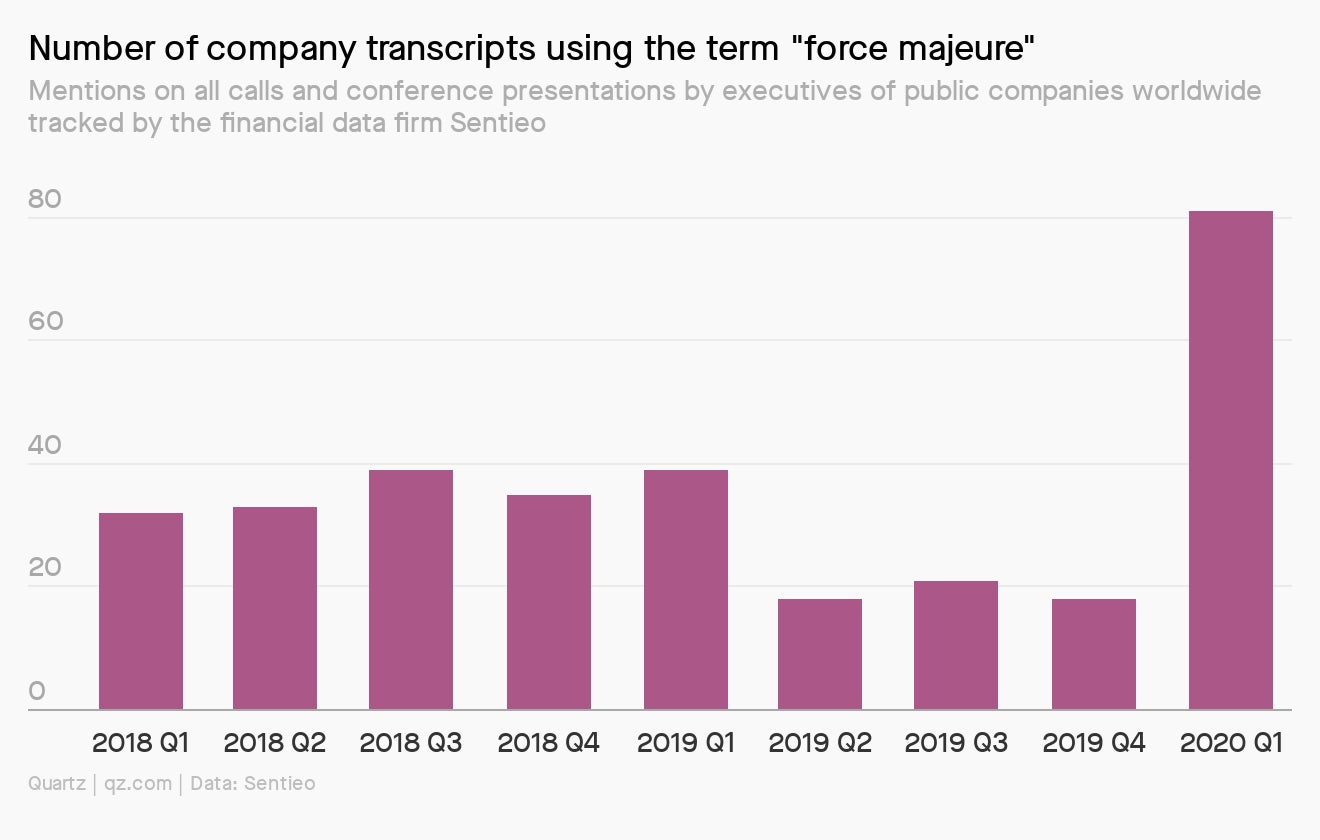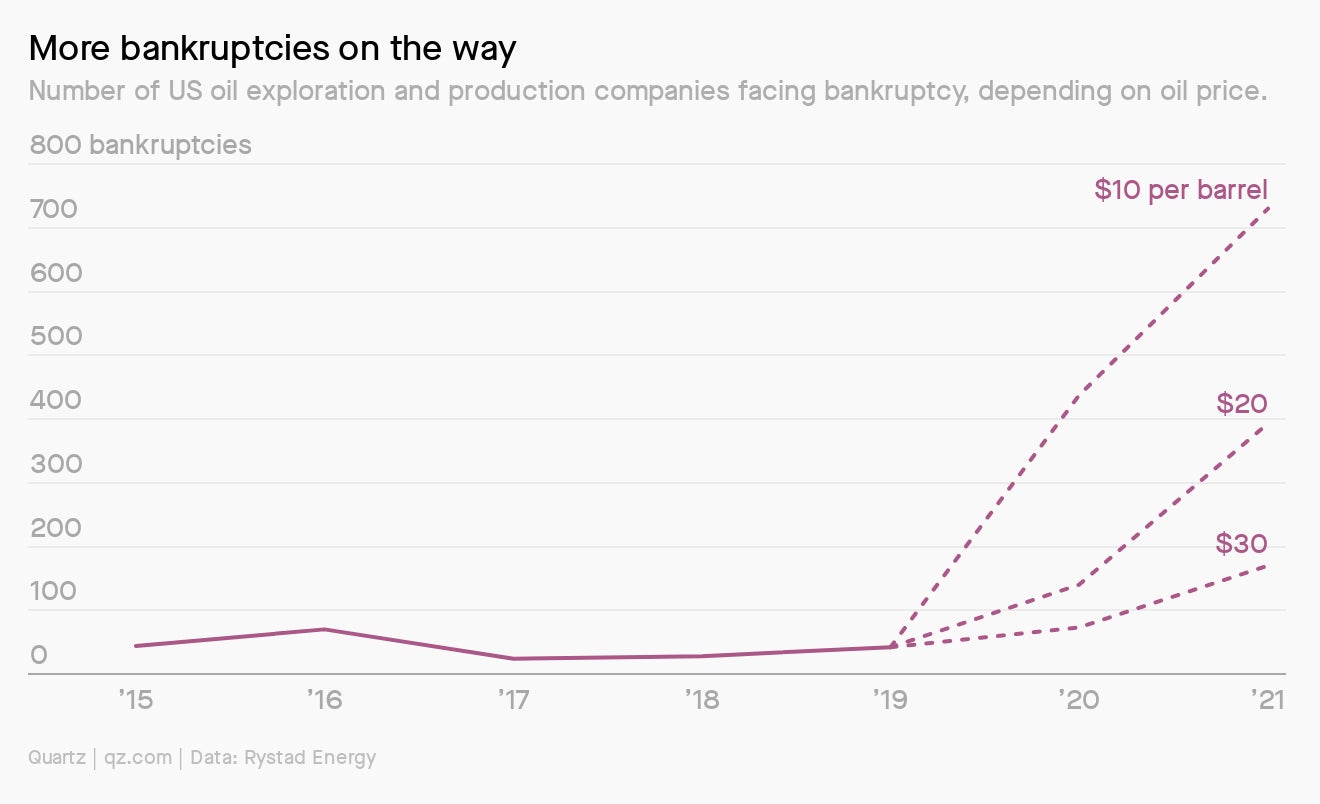Coronavirus: A disturbance in the force majeure
Hello Quartz readers,

Hello Quartz readers,
Last week we asked about your coronavirus heroes—as usual, you did not disappoint. Here are a few of our favorites:
- Charles P.’s hero is his daughter, who works as a fingerprint technician in one of the largest jail complexes in Florida. He writes: “Not many folks see that the people behind the scenes, those who support the first responders, are in as much if not more personal danger—they deal with hundreds of people per shift. They go to work every day. She, they, are heroes.”
- Oluwasooto A.’s hero is Ibukun Awosika, chair of the First Bank of Nigeria, who “took the initiative of starting an Instagram campaign called the Citizen for Citizen initiative, which makes it much easier for Nigerian citizens, even those in the diaspora such as me, to give back.”
- James A.’s heroes are his daughters (ages 7 and 4) who are sleeping on their bedroom floor for as many nights as possible to raise money for Bowel Cancer UK. The charity funds research and provides support to bowel cancer patients, one of whom is their dad. Props to you, Evie and Ida, for philanthropy that also means not making the bed.
✉️ Keep sending those heroes. And now, let’s get started.
Are you there, god? It’s me, small business.
Force majeure. It sounds like an artistic technique—a foil to deus ex machina, for instance, or the technical name for the final movement of a great symphony. In fact, it’s an obscure legal term that does indeed denote something dramatic: “an event (as war, labor strike, or extreme weather) or effect that cannot be reasonably anticipated or controlled,” according to Merriam-Webster.
Practically speaking, says attorney and Hashtag Legal founder Jamie Lieberman, “it is a clause that’s written into many contracts that allows a contract to be canceled or postponed due to impossibility performance.” Sometimes referring to “an Act of God,” these clauses have often historically applied to natural disasters such as floods or earthquakes, though looser definitions have sometimes found merit with courts. Now, with businesses facing some of their worst losses in years, many are wondering whether coronavirus might also fit the bill.
There are many reasons companies might want to invoke force majeure, from looking to renegotiate a delivery schedule to nixing a contract altogether. But it’s less straightforward than it seems. “The party that’s seeking to invoke the force majeure clause has to show a causal link between the force majeure event and its failure to perform,” said Jennifer Tsai, a legal associate at Kira Systems, a company that uses AI to analyze contracts, in an online webinar. “Not surprisingly, whether the coronavirus pandemic counts as a force majeure event under a given contract depends on the wording of a force majeure provision in that contract.”

Often, a contract will explicitly state what constitutes an Act of God. When it doesn’t, parties may have to rely on legal precedents, or go to court to tussle it out. The bar is often set high: “Generally speaking, force majeure requires actual impossibility and not merely extreme difficulty,” notes a guide to these clauses put out by international law firm Cooley LLP. Legal impossibility, where an action or order from the government makes something illegal, may also meet the standard.
Companies and other entities have long attempted to use force majeure to get out of legal contracts under difficult circumstances, sometimes to their peril. In 2015, the Moroccan government attempted to use the force majeure clause in its contract to postpone the African Nations Cup, due to the Ebola outbreak that eventually killed more than 11,000 people. But the Confederation of African Football (CAF) did not agree with its assessment, on the grounds that it would still be possible for the country to host the soccer tournament, if somewhat more difficult. Ultimately, Morocco was held liable by the CAF, banned from the next two African Nations Cups, and fined $1 million.
Key numbers for Quartz members
🕒 73%: Increase in time Indians are spending with Netflix—now at 80-plus minutes a day—since a nationwide lockdown began on March 25. Meanwhile, a homegrown competitor is suffering.
📱 29: The number of countries using data from mobile phones to help contact possibly exposed people, enforce quarantines, and analyze social patterns. We’re tracking all of them.
🍔 $10 million: The size of a loan that publicly-traded Shake Shack received from the US Paycheck Protection Program, which is geared towards small businesses. Following outrage, the restaurant chain said it would return the money to the government.
Not to force majeure the issue, but why not experience Quartz membership with a ✦ 7-day free trial? Then whenever we compliment our members—who by the way have amazing vocabularies and great taste in furniture—you can think “Hey, that’s me.”
Bubble, bubble, oil and trouble
Fracking helped make the US the world’s top oil producer, but it’s an expensive enterprise. Since the coronavirus outbreak, oil prices have fallen to record lows, from above $60 per barrel in January to under a dollar this week. On Monday, futures prices for the US oil benchmark went below zero for the first time ever.
The cause was a chain reaction. Travel restrictions and social distancing mean that global demand for oil will plummet more than 9% this year, according to the International Energy Agency. For the month of April, the figure is closer to 30%. And while global producers, particularly Russia and Saudi-led OPEC, agreed last week to cut production by 9.7 million barrels, that’s less than half of the demand that has disappeared.
That’s a big problem for fracking companies, almost all of whom require oil prices of at least $30, if not much higher, to make a profit. “I don’t think it’s a death knell, but it’s definitely an inflection point for this industry,” says David Livingston, a senior oil analyst at Eurasia Group. “When you come out the other side, to the degree that shale survives, you may see an industry that has consolidated significantly.”

Coronaversation starters
We’re getting a bit tired of being asked how we’re doing, especially since the answer has been 🤷 + 😭 for weeks. So today we wanted to share some fun new prompts to try out with your friends, family, and colleagues on the many Zooms ahead. These are sourced from years of, um, serious investigative reporting.
- What’s something you miss that surprises you?
- Does technology free us or trap us?
- Who did you want to be at seven years old?
- Recite a story with a cow as the protagonist.
- What is your favorite property in Monopoly, and why?
- Would you rather be a dog or a ghost?
We’re kind of obsessed with that last one, and it would not be an exaggeration to say we discuss it at most weekly meetings. So what do you think: dog or ghost? And ✉️ tell us why (points for passion).
Essential reading
- The latest 🌏 figures: 2,501,156 confirmed cases; 659,732 classified as “recovered.”
- Air supply: Doctors are facing a ventilator catch-22.
- Mask factor: Face masks exclude the deaf and hard-of-hearing community.
- Delivering: Lockdown has added $24 billion to Jeff Bezos’ net worth.
- Keeping calm: Coronavirus shows it’s time to legalize marijuana.
- Low-hanging fruit: Testicular tissue generates proteins the virus likes to latch onto.
Our best wishes for a healthy day. Get in touch with us at [email protected], and live your best Quartz life by downloading our app and becoming a member. Today’s newsletter was brought to you by Natasha Frost, Tim McDonnell, Susan Howson, and Kira Bindrim.